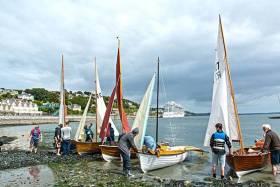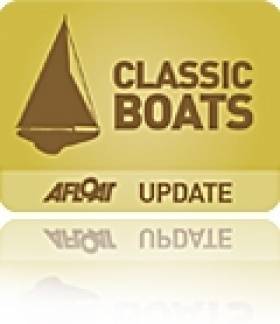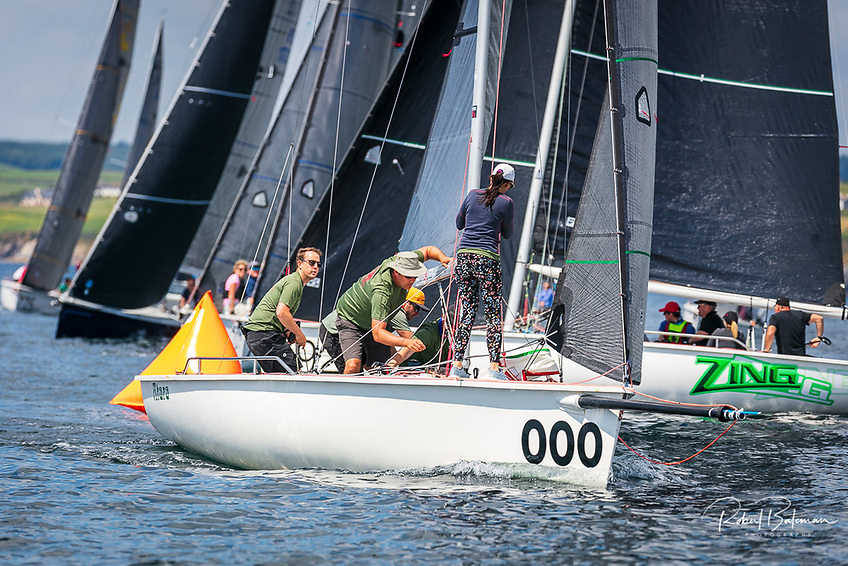Displaying items by tag: Rankin
There is more to sailing than racing, such as enjoyment, fun, cruising and bringing people together to enjoy each other’s company and the boats they sail. When those boats are dinghies that have a proud history and which a dedicated group of enthusiasts is determined to protect and develop, there is something special about the boats, the people and their interest in sailing.
Next Sunday facets will be brought together when the Rankin dinghies gather at Whitepoint, a promontory near the Cork Harbour town of Cobh where the town’s sailing club has been active for many years.
The boats that will be the focal point at half-past ten on Sunday morning will be Rankins, a dinghy which was built in Cobh, of which it’s believed there were 80 and of which The Rankin Dinghy Group has traced nearly half, one with a unique name linking a historic gun boat that unusually fought both for and against the Irish and a man who crewed on it, on both sides! It’s an intriguing story.
Enthusiasts who preserve boats are special people as far as I am concerned and I admire them. They are single-minded and dedicated. That dedication can come from admiration of a particular type of boat, of the man or men who built it, how it performs and often because they have been involved with the class of boat themselves and are seeking to avoid its decline and restore it to appreciation by more people.
The name of the Rankin dinghies is revered in Cork Harbour and particularly in the harbourside town of Cobh. And the name of one of those boats links the gunboat which fought against the Irish Volunteers during the 1916 Easter Rising and later for the emergent Irish Free State Government against anti-Treaty Forces during the Irish Civil War. It also links the renowned boat-building Rankin family in Cobh, one of whose members crewed on the gunboat.
Listen to the Podcast below in which I talk to two dedicated sailing enthusiasts, Maurice Kidney and Conor English, who are driving the restoration of the Rankin dinghies in Cork Harbour. They have discovered that Rankins were bought and sailed in several parts of the country.
You will hear how the name of the gunboat which shelled Liberty Hall during the Easter Rising of 1916, Helga, is maintained on a dinghy in Cork Harbour. How that gunboat, having fought against the Irish Volunteers, later fought for the emergent Irish Free State and became the first Irish fisheries protection vessel, Muirchu.
It’s a fascinating story about a special type of boat that The Rankin Dinghy Group is reviving. Having traced half the 80 boats which were built, the Group is asking anybody with information on the whereabouts of Rankin boats in any condition to contact Maurice Kidney on phone 086 3225424 or Conor English on phone 086 3531122.
• Listen to Podcast below. An article on the Rankins by Tom MacSweeney will also appear in Summer Afloat magazine
See a slideshow on the Rankin dinghy here
Cobh Trad Sail Maritime Lecture Series 2016
Cork Harbour's Cobh Trad Sail Maritime Lecture Series 2016 will be its most diverse, celebrating the harbour's great maritime tradition.
11th Feb: Escaping to Europe by Sea Humanitarian Operations in the Mediterranean 2015 by the Irish Naval Serice. Presented by Commander Ken Minihane and Lt Joe Daly.
18th Feb: Parking a City Berthing a Large Liner at the Deep Water Quay Cobh. Presented by Tony Mulcathy, Cork Harbour Pilot.
2nd March: Our Rankin Boats. History of Rankin Boat Building in Cobh Presented by Eddie English, Sailing Instructor
All lectures held in the Sirius Art Centre, Cobh at 20.00 hrs.
Entrance fee €5.
#tradsail – Now in its fourth year, Cobh Traditional Sail Regatta will be held from 27th to the 29th June 2014, on the waters adjacent to the amphitheatre of the town of Cobh. The event is organised in association with The Cove Sailing Club and the Naval Service Yacht Squadron. It is an opportunity to enjoy both sea and shore activities with traditional sailing trips, traditional music, sea shanties and an eventful prize giving ceremony.
The opening ceremony takes place in the Sirus Centre on Friday 27th at 19.30 hours, with entertainment provided by local sea shanties group the Mollgoggers and local musicians
On Saturday and Sunday a full programme of events is planned with the Rankin, Cork harbour One Design and White Sail Fleet racing in the beautiful setting of Cork Harbour. There will also be an opportunity to tour the traditional wooden vessels the Ruth, the Irene and the Soteria. Tours are also available to Spike Island .
In keeping with the ethos of the festival of promoting sailing amongst young people the festival is sponsoring eight young people to participate in a week's sail training on the Spirit of Oysterhaven in June. These teenagers are drawn from various schools and organisations in Cobh.
For more information click for the tradsail website






























































